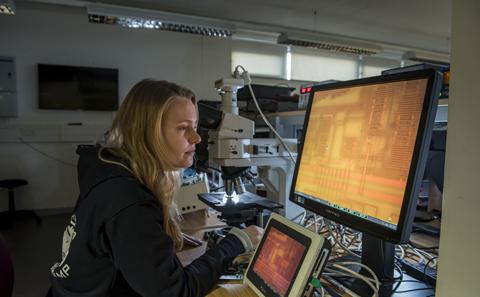The time is right to capitalise on artificial intelligence

The UK government has recently published a review of the UK's capabilities in artificial intelligence. This review was co-chaired by Southampton professor Dame Wendy Hall. Here Professor Dame Wendy Hall talks through why she feels we now need to act in order to realise the full potential of AI and achieve the positive benefits it can deliver.
A huge surge in automation
Artificial Intelligence (AI) has been around for a long time as a concept, but in reality we’re now seeing a major surge in the technological development of AI which is likely to see automation continue to escalate and accelerate.
The machines we’re building today are so much more powerful than ever before in terms of their processing power and storage ability, and because of the huge amounts of data available, we’ve vastly improved our capacity to build intelligent systems that can learn and begin to ‘think’ for themselves, although it’s still an open question as to whether they will ever really be able to outperform the human brain.
As a result, we’re seeing a huge surge in automation in every walk of life which places even greater importance on the recently-published government review of Artificial Intelligence in the UK which I co-chaired alongside Jérôme Pesenti, Chief Executive of BenevolentTech. But we now need to act in order to realise the full potential of AI and achieve the positive benefits it can deliver.

Our groundbreaking work in AI
Artificial Intelligence is a long-established discipline at the University of Southampton, with a world class reputation.

MSc in Artificial Intelligence applications rise
The University of Southampton’s MSc programme in Artificial Intelligence (AI) has attracted a surge of interest. Find out more about this one year course.
18 specific recommendations
Through our review, we made 18 specific recommendations including a number that focus on ways in which universities, research institutes, industry and government can come together to better prepare us for the AI landscape of the future. Universities are on the ‘front line’ to help prepare and upskill the country’s future workforce, but they’re also key to the future of research, development and commercialisation of AI to benefit the economy and society as a whole.
We’ve emphasised the importance of skills and the need to increase the UK’s expertise through industry-funded Masters programmes in AI and Masters-level conversion courses with funding and other forms of support coming directly from industry. AI is where the new ‘big salary’ jobs will be, but the demand from industry for new talent is already outstripping the supply so we need to continue to create additional courses and places for generating new talent in the UK whilst improving our responsiveness of our skills training system to the demand. At the same time we have to reduce the gap between industry and academia, attracting the best talent from around the world to the UK and create more opportunities for women and other underrepresented groups.
We’ve also made recommendations to increase the uptake of AI to help organisations and workers understand how AI can boost their productivity and make better products and services, including public services.
Data sharing and access is another key area we’ve concentrated on so we can ensure that people and organisations can be confident that use of data for AI is safe, secure and fair, making more data available from publicly-funded research. We also want to build on the UK’s strong record in cutting-edge AI research with targeted proposals including making the Alan Turing Institute a national institute for AI in the UK.
Ever since computers were invented, people have talked about how they can help us to learn and that’s what got me into computing in the first place.
I’m fortunate to have lived and worked during one of the world’s most important technological revolutions which has delivered some huge breakthroughs, although I don’t believe we’ve arrived yet at what will be a ‘steady state’ of the future, if there ever is one.
Now is the time for us all - scientists, researchers, entrepreneurs and the government - to come together and address the issues about how AI is going to impact society and seek ways to ensure that we’re able to deliver the great breakthroughs the technology has the potential to deliver for the benefit of society.

I was very honoured to be asked to co-chair this review at a time when AI is set to make major changes to the way we live and work
Links to external websites
The University cannot accept responsibility for external websites.